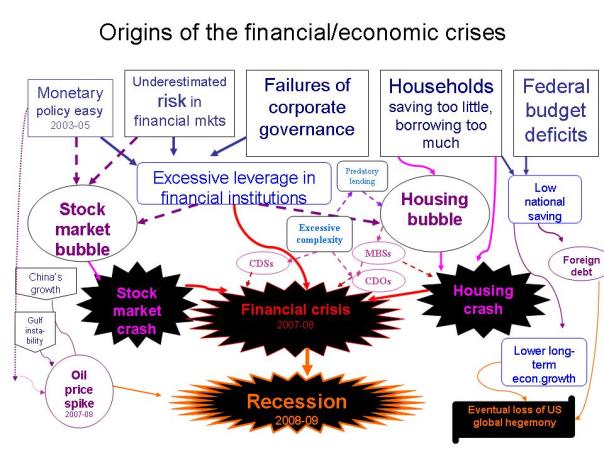I came across this blog post today. I skimmed it and thought it looked rather interesting in light of our class discussion last week. In particular, pay close attention to what the writer says is the importance in Marxian analysis of the word, “crisis.” Recall O’Connor’s use of the word in his article. What is being conveyed is the idea of a complete breakdown in confidence. In a capitalist economy, confidence is key (you don’t have to read Marx to believe that). Therefore, if there is a lack of confidence or declining confidence then things can go south pretty fast. That’s what happened according to the Marxian viewpoint. The conclusion is pretty scary if you believe the writer: We’ve come to the point where we are not trying to save either the poor or the rich, but the system itself! As you read this, think about how a Neo-classical of Keynesian might respond. Do you think they would predict a complete and total collapse of the entire system as readily? How would they challenge the Marxian perspective on the data?
Archive for January, 2009|Monthly archive page
Short essay question
In class stuff on January 31, 2009 at 9:23 AMConservatives and liberals offer different views regarding the role of government in the current financial crisis. Conservatives contend that government involvement in the economy has contributed to deficit spending, over-regulation and high taxes; while liberals contend that deregulation or lack of government intervention is the leading cause of the current fiscal crisis. Given the difference between the two camps, defining/understanding government’s role in the economy is an important step in finding a solution to the current crisis.
Read the articles by Gordon and Blinder and watch the interview with Martin Feldstein and Joseph Stiglitz on Charlie Rose. What can you infer about what the writers and the interviewees think about government’s role? How do Stiglitz’ and Feldstein’s attitudes toward Obama’s fiscal stimulus plan reflect their conception of the proper role of government in the economy? Where would you classify each one in terms of the three paradigms discussed in class?
Good weekend
In economics, miscellaneous, statistics on January 30, 2009 at 10:29 AMA little later today, Joshua will be uploading the question for the short essay assignment. I am looking for a paper that is between 700-1,000 words in length, double-spaced, and APA format. The due date is February 11. You can hand it in before class by emailing it to me or you can give it to me in class.
I came across this interesting article on income inequality. The article basically documents the redistribution that has been occurring since the 1970s, which has seen income flow increasingly to wealthy Americans. The authors note that “Excluding capital gains, the richest one percent claimed 17.4 percent of all pre-tax income in 2005, more than double what that figure was in the 1970s. (It bottomed out at 7.8 percent in 1973.) This is the greatest concentration of income since 1936, when the richest one percent received 17.6 percent of total income.”
The article, which is found on inequality.org (a project of Demos and the Institute for Policy Studies) is chock full of graphs and tables that underscore the massive transfer of wealth from middle-income and lower Americans to the well-to-do. There is also an excellent section at the end that takes the reader to the original sources for the data.
We will be discussing income inequity in some detail in a couple of weeks. This article will serve as a good backdrop for that discussion. One thing to keep in mind as you are thinking about income inequality is “How much of this transfer of wealth is a result of public policy?” “If much of the redistribution is the consequence of public policy, how much of it was supported by the voting public?
Origins of the economic crisis
In economics on January 29, 2009 at 11:30 AM
Source: Jeff Frankel's Weblog Dec 5, 2008
Who killed the economy
In economics on January 29, 2009 at 10:12 AMNow you play the game that is keeping economists up late at night. Trying to figure out who is most at blame for killing the economy. Just click on this link to vote on who is the most blameworthy. Will it be Greenspan or Bush? Maybe it will be something like Hedge Funds and China instead of someone.
There is class tonight
In class stuff on January 28, 2009 at 5:35 AMDespite the snow and ice, the powers-that-be have mandated that learning will go on! Take a look at the discussion questions from yesterday’s and the first post.
Charlie Rose – A conversation about Obama’s economic stimulus package
In stimulus on January 27, 2009 at 1:46 PMMartin Feldstein and Joseph Stiglitz discuss Obama’s stimulus package on Jan 27, 2009
Vodpod videos no longer available.
Some discussion points for tomorrow’s class
In miscellaneous on January 27, 2009 at 1:18 PMIn addition, the questions from last week’s first blog post, please come to class tomorrow prepared to discuss the following:
1) Which of Musgrave and Musgrave’s three fiscal functions of government is the most controversial and why?
2) What is Musgrave and Musgrave assuming about society’s current distribution of income?
